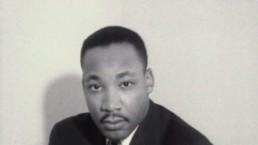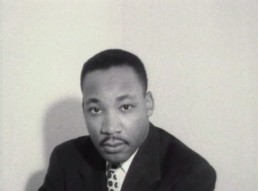‘MLK/FBI’ Review: The Extreme Measures Taken to Silence a Hero
Opening at Arena Cinelounge Drive-In and on-demand January 15, 2021.
With all of the political unrest and never-ending news cycles populating our feeds and our minds as of late, another “charged” documentary may not sound like the type of film you’d want to spend your free time watching. I can relate to the feeling of utter exhaustion, but I hope you’ll make MLK/FBI an exception. Sam Pollard’s revelatory documentary exposes not just the private emotional hardships suffered by Dr. Martin Luther King, Jr. at the hands of then-FBI director J. Edgar Hoover, it stands as an eerie mirror to our current state of political manipulation and ongoing bias and violence toward the BIPOC community.
We all know Dr. Martin Luther King, Jr.’s life-changing contribution to American society through his March on Washington, the “I Have a Dream” speech and other inspirational, peaceful demonstrations that led to the desegregation of black people. What caught me by surprise was the FBI’s many attempts to discredit his leadership by surveilling him with wiretaps, undercover photos, and bugging his family home. These findings from the early 60s have now been uncovered and are the basis of MLK/FBI.
Dr. King’s rising success scared Hoover, the documentary claims, as a now-declassified memo sent around the FBI headquarters stated, “We must mark [Dr. King] now as the most dangerous Negro in the future of this Nation…” Hoover also thought Dr. King was “morally unfit” to be a leader for Black America, a hilariously ironic and completely ridiculous statement given the obvious example of what an actual morally unfit leader looks like.
Hoover also thought Dr. King was “morally unfit” to be a leader for Black America, a hilariously ironic and completely ridiculous statement given the obvious example of what an actual morally unfit leader looks like.
Educators and historians provide voiceovers that carry MLK/FBI and unanimously agree this was the “darkest part of bureau’s history.” The film is comprised of archival footage showing how they surveilled him, in addition to footage of political events, KKK rallies, interviews with Dr. King, and more. But for as shocking as this story is, at times, the film feels repetitive in its visuals. Perhaps seeing the narrators’ faces throughout would provide a better human connection instead of watching scenes from a Buster Keaton or scripted Universal Pictures FBI film multiple times.
America has an ugly past; we can’t ignore that. The only way to truly make progress towards a more inclusive future is to acknowledge past inequalities and make substantial changes so the attitudes and behaviors of the past don’t bleed into the future. Dr. Martin Luther King, Jr. is remembered for many things, but right now, it’s so important to revisit his message of fighting back with love, as “violence will not succeed in changing this nation.”
Distributed by IFC Films, opening in select theaters, including the Arena Cinelounge Drive-In in Hollywood, and on-demand January 15, 2021 (MLK Weekend).
Morgan Rojas
Certified fresh. For disclosure purposes, Morgan currently runs PR at PRETTYBIRD and Ventureland.


